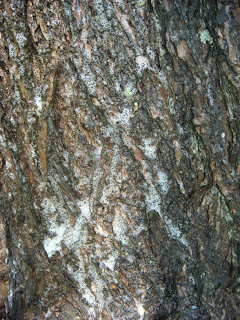A “CCC Boy” Comes Home: Walter Edmonds revisits Mt. Ascutney
 Seventy years have passed since Walter Edmonds, now 88, spent a year working on a crew building the toll road at Mt. Ascutney State Park in Windsor. Edmonds enlisted in the Civilian Conservation Corps. in May, 1936 at age 17 on the advice and recommendation of a high school teacher a year before he was due to graduate. "My gosh, this was all a meadow," said Mr. Edmonds, looking around the park entrance, now surrounded by 80-fot tall white pines. "Barracks #1, where I bunked, was built right over the stream there. It sung me to sleep at night." Edmonds spent a misty day in September, 2006 visiting with park staff and telling tales of camp life and work on the mountain. Mr. Edmonds and his daughter Debbie were treated to a buffet lunch and give a tour of the present day park.
Seventy years have passed since Walter Edmonds, now 88, spent a year working on a crew building the toll road at Mt. Ascutney State Park in Windsor. Edmonds enlisted in the Civilian Conservation Corps. in May, 1936 at age 17 on the advice and recommendation of a high school teacher a year before he was due to graduate. "My gosh, this was all a meadow," said Mr. Edmonds, looking around the park entrance, now surrounded by 80-fot tall white pines. "Barracks #1, where I bunked, was built right over the stream there. It sung me to sleep at night." Edmonds spent a misty day in September, 2006 visiting with park staff and telling tales of camp life and work on the mountain. Mr. Edmonds and his daughter Debbie were treated to a buffet lunch and give a tour of the present day park.Mr. Edmonds spent a year with the CCC, starting out on the toll road “making small rocks out of big ones” swinging a sledge hammer, then moving on to the survey crew that laid out the trail system. He shared many stories of camp life, the life-long friends he made there, and how his experiences shaped his life. “Everyone remotely connected with the CCC was doing themselves a big favor, and also the country, by educating themselves,” said Edmonds, referring to the program that put millions of young men age 16 and over to work on public works projects during the Great Depression. By working in the rugged setting, he became familiar with the birds, trees and fish native to the area. A boy from Boston such as him would not have had such an opportunity, he said. Compensation was $30 per month; $5 went to the corps member, the rest was sent home to his family. The pay plus the promise of ample food and a roof over one’s head was seen as a good deal.
Mr. Edmonds described a scene of hard work and camaraderie at the park. Corps members were fed 3 hearty meals a day, performed 8 hours of work and took on duties assigned at the camp. The largest crew at the park took 5 years to construct the toll road which involved blasting, breaking by hand, and moving hundreds of thousands of cubic yards of rock and fill. Progress was made at the rate of up to 60 feet per day. Another crew spent 3 years constructing park facilities out of native Ascutney granite. A third crew did survey work for the road and trail system. Work continued year round when possible, through extreme cold and heavy snow, but never at breakneck pace. “Everybody worked hard, and no one was pressed for time,” Mr. Edmonds said, illustrating that they were given ample time to do the job correctly.
The program was a unique mix of civilian and military personnel. Civilian corps members worked on crews supervised by state and federal government engineers, and US Army officers oversaw camp life.
This wasn't Walter Edmonds’ first visit back to the park; he returns regularly to drive up the toll road and to hike the trails. He maintains his top physical shape by getting out regularly and even hiked to the summit of the mountain earlier in the summer. On this visit, staff honored him with a luncheon and a card of appreciation. Mr. Edmonds plans to keep returning to the park on a regular basis. He summed up his experiences in 1936-37 as “the happiest time of my life!”

.jpg)
.jpg)
Comments
Post a Comment
Feel free to let us know what you think.